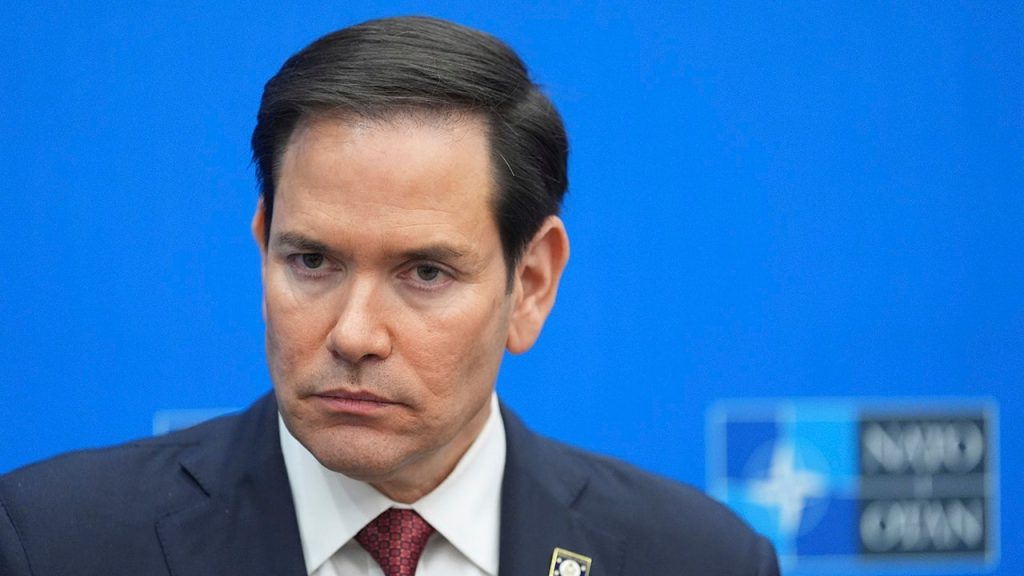In a significant address at NATO headquarters in Brussels on April 4, 2025, U.S. Secretary of State Marco Rubio emphasized the need for a comprehensive overhaul of global trade practices. Responding to criticisms regarding the negative impacts of President Donald Trump‘s newly implemented tariffs, Rubio defended the administration’s actions, asserting that the current trade system is detrimental to American manufacturing and must be recalibrated. He highlighted that the United States must transition from being predominantly a service exporter to reviving its manufacturing base, which is essential for job creation and economic stability.
| Article Subheadings |
|---|
| 1) The Call for a Trade Overhaul |
| 2) Critique of Current Global Trade Practices |
| 3) Economic Implications of Trump’s Tariffs |
| 4) Adjusting to the New Trade Rules |
| 5) The Future of American Manufacturing |
The Call for a Trade Overhaul
During his remarks in Brussels, Secretary Marco Rubio asserted the urgency of “resetting the global order of trade,” emphasizing that the United States, as one of the largest consumer markets in the world, needs to expand its manufacturing capabilities. His comments come in response to ongoing dialogues regarding trade distortions that impact American industries, especially in the wake of President Donald Trump‘s recent tariffs that have stirred international tensions. Rubio declared, “We need to get back to a time where we are a country that can make things,” articulating a vision for a robust manufacturing sector that can compete globally.
Critique of Current Global Trade Practices
Rubio’s critique of existing global trade dynamics sheds light on his perspective of their inherent flaws. He branded the current system as “bad for America,” arguing that it favors foreign entities at the expense of domestic manufacturing. He pointed to the example of China, highlighting how it primarily functions as an exporting nation that does not reciprocate in consumerism. “They don’t consume anything. All they do is export and flood and distort markets,” he commented, indicating a need for a level playing field for American manufacturers. This sentiment resonates with his assertions that the U.S. cannot afford to remain in a trade structure detrimental to its economic interests.
Economic Implications of Trump’s Tariffs
The economic implications of Trump’s “Liberation Day” tariffs were also a focal point of Rubio’s discussion. He acknowledged the potential fallout for companies reliant on Chinese production as the new tariffs increase operational costs. Nevertheless, he maintained that “markets will adjust” once businesses understand the new rules of engagement in trade. He noted how short-term market fluctuations might occur as stakeholders reassess the new financial landscapes, yet he remains confident in the long-term benefits of implementing such tariff structures, viewing them as necessary actions to rectify long-lasting inequities in international trade practices.
Adjusting to the New Trade Rules
A significant aspect of Rubio’s argument revolves around the principles of predictability and clarity in trade regulations. He asserted that “businesses around the world” needed to know the operational framework to adapt effectively to the evolving landscape of international trade. In his view, once companies grasp the implications of upcoming regulatory changes, they will recalibrate their operations accordingly. This redemption of knowledge among businesses is pivotal for ensuring stability within stock markets and fostering economic vitality across various sectors of American industry.
The Future of American Manufacturing
In closing, Rubio’s address invoked the necessity for a revitalized American manufacturing sector, one that can offer employment opportunities and economic resilience. He stressed that the U.S. should not remain passive in the face of global economic competition, citing the essentiality of innovation and production capacity in maintaining its stature as a leading economy. As his remarks resonate through the corridors of power in Washington, the discussions on how to shape future trade agreements may well determine the trajectory of American economic policy in the coming years.
| No. | Key Points |
|---|---|
| 1 | Secretary Marco Rubio advocates for a comprehensive overhaul of global trade practices. |
| 2 | Rubio criticizes the current trade dynamics, particularly highlighting the imbalance with China. |
| 3 | The economic implications of Trump’s tariffs are significant, with anticipated costs for companies reliant on Chinese manufacturing. |
| 4 | Predictability in trade rules is crucial for businesses to adapt effectively. |
| 5 | Rubio emphasizes the necessity of revitalizing American manufacturing to create jobs and drive economic growth. |
Summary
In summary, Secretary Marco Rubio‘s remarks at NATO highlight a pivotal moment in U.S. trade policy as it embarks on a journey to redefine its relationship with global trade partners. The drive towards a more robust manufacturing base aligned with fair trade practices aims not only to enhance economic growth but also to secure American jobs. As the administration navigates the complexities of international trade, the implications of these policies will reverberate through various sectors and may shape the country’s economic landscape for years to come.
Frequently Asked Questions
Question: What are the primary objectives of Trump’s tariffs?
The primary objectives of Trump’s tariffs are to protect American industries, encourage domestic manufacturing, and reduce trade deficits with foreign nations, particularly through measures aimed at countries like China.
Question: How do current trade practices affect American manufacturing?
Current trade practices negatively impact American manufacturing by favoring countries with lower production costs and barriers, making it challenging for U.S. manufacturers to compete effectively in the global market.
Question: Why is predictability in trade rules important for businesses?
Predictability in trade rules is crucial for businesses as it allows them to plan for the future, make informed investment decisions, and adapt to changes without significant financial risk.


